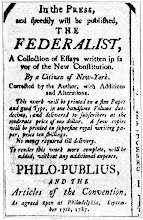"A Republic, if you can keep it." Sour grapes after the last election? Hardly. Benjamin Franklin made this statement at the close of the Constitutional Convention in response to a question about the kind of government the Convention was proposing to the newly independent Americans. (http://www.bartleby.com/73/1593.html) But Benjamin Franklin’s comment is as poignant today as it was in 1787. Perhaps even more so.
The Founders in the summer of 1787 launched this country on a bold experiment. They created a government from the bottom up rather than from the top down. Sovereignty, the power to govern, derived not from a monarch or the state but from "we the people."
The Founders recognized that the new nation was too geographically large for "we the people" to make every governmental decision, for "pure democracy," and so proposed a representative democracy, a republic. Under this scheme, "we the people" delegate governmental decision making and the implementation of the decisions made to a legislature and an executive. But first and foremost these delegated representatives derive their authority from and remain accountable to "we the people."
This system has survived to the present day. There is good news. This election has energized "we the people." A larger percentage of us voted than in many years. But there is bad news. "We the people" suffered a barrage of insulting advertising from both sides, calculated to influence opinion and votes based on guttural and unreasoned feelings. If you voted against Obama because of unsettled concern that he would usher in socialism, or if you voted against McCain out of an uncomfortable fear that he would continue George Bush’s policies then, with all due respect, you did not cast an intelligent ballot.
Going forward after this election, we have two choices. First, we can retreat back to our everyday lives, let those to whom we have delegated our authority to govern go about that business, check back in two or four years to see how they have done, and then, based on our gut (with the aid of 30 second sound bites) decide if they have served us well or not. Alternatively, we can exercise vigilance, keep informed, critically evaluate the performance of our elected representatives, let them know our opinions on decisions they are about to make, and hold them accountable for those decisions.
The rallying cry of both sides in the last election was "change." And surely change is coming. But change is a neutral word. The Merriam-Webster Online Dictionary defines "change," used as a transitive verb, as :
"1 a: to make different in some particular : alter
So defined, change itself has no content. Change can be good, such as the change in this country after ratification of the Constitution. Or change can be disastrous, as in Germany after the Nazis came to power. So hoping, and voting, for change for the sake of change is meaningless. "We the people" must give content and direction to the change we have voted for.
But how can we, with our busy lives and limited resources of time or energy, make a difference for insuring that we keep our republic and make it better? Where will we get the information we need? How can we evaluate the facts and form intelligent opinions? And how can we make our voices heard by those we has entrusted to represent us? I confess to you that I have no silver bullets to offer. But in subsequent weeks I will explore these questions and share my findings with you in this blog.
I am, however, certain of this much. We live in most difficult times. Our economy is in extreme distress with the bedrock elements - banks, insurance companies, industries - failing and begging for government bailouts. We continue to live in a dangerous world in which forces of evil have taken a death oath to topple our way of life. We will hear that we must give our leaders a blank check to address these problems because they are beyond our understanding. "We the people" must resist this invitation to abdicate. Benjamin Franklin calls to us across the ages: "Well, fellow Americans, what have we got - a Republic or a Monarchy?" We must answer, resoundingly, "we have a Republic, and we will keep it."
